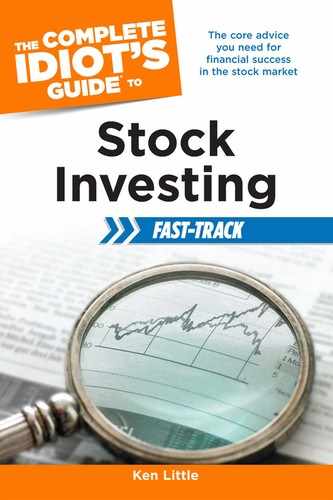A major concern for all investors is to hold down the expenses of investing, which reduce your gains. Expenses fall into two categories: direct investing expenses (broker commissions, for example) and taxes. I will cover investing expenses in Chapter 10. Taxes that you pay or avoid in investing are controlled by when and how you buy and sell stocks. There are two major forms of taxation on investors: capital gains and dividends. However, before I discuss taxes directly, there are strategies to avoid some taxes and defer others until much later.
Taxes are a part of our lives and there is no getting around that fact. That said, there is no legal or moral reason for you to pay any more than you are legally required to pay. With some planning and foreknowledge, you can keep your tax bill for your stock investing to a minimum.
This is not about tax dodging or evasion, nor is it a substitute for competent tax counsel for complex tax issues. I have an agreement with my tax attorney friends—I don’t practice tax law and they don’t sue me. So far, it’s working out pretty well.
The best strategy is to place as much of your stock investing in a tax-qualified account as possible. Tax-qualified accounts, such as 401(k) plans and the various IRA accounts, allow your investment to grow tax-deferred (or tax-free in the case of Roth accounts). This means that as long as the investment and any income, such as dividends or profits from sales, remains in the tax-qualified account, you pay no taxes on the gains. In regular tax-qualified accounts, you don’t pay income or other taxes until you begin withdrawing money, presumably in retirement. This allows more of your money and earnings to remain and benefit from compounding. There are a variety of rules and regulations you must follow (and even more for Roth accounts) regarding withdrawals. In most cases, if you wait until you are at least 591⁄2, you avoid any penalties. I can’t cover all the issues with qualified accounts, but it is well worth your efforts to learn more from competent tax advisers.
| MARKET RISK |
There are two main ways income or profits from investing in stocks may be taxed:
• Capital gains tax
• Dividend income tax
Capital gains tax. A capital gain occurs when you sell an asset for a profit. That asset could be a house, land, machinery, stock, or a bond. When that happens, you have experienced a capital gain. You figure the capital gains tax on the difference between your “basis” in the stock and the sales price. This difference is your profit or loss. The basis is usually what you paid for the stock. However, if you inherit the stock, the basis is the price of the stock on the day the owner died.
If the difference between the basis and the sales price is negative—in other words, you lost money—you have a capital loss, which you can use to offset capital gains in some cases.
There are two types of capital gains:
• Long-term capital gains
• Short-term capital gains
It is very important to understand the difference and why one is better than the other:
Long-term capital gains. You must hold the stock at least one full year to qualify for the long-term capital gains rates. This is extremely important and I encourage you to make absolutely sure by holding the stock one year and a day at least. The tax on a long-term capital gain is currently 15 percent if you are in the 25 percent income tax bracket or higher and just 5 percent if you are in the 15 percent or lower tax bracket.
Short-term capital gains. If you hold a stock less than one year before selling it, the IRS classifies the sale as a short-term capital gain and taxes the profit as ordinary income. This means you could pay 25 percent or much higher of your profit in taxes.
Unless there is a compelling reason, hold on to the stock long enough to qualify for the long-term capital gains rates.
In some cases, a short-term or long-term capital loss can offset all or part of the tax.
Dividend tax. Companies that distribute profits through dividends create a taxable event for you. The IRS taxes dividends at 15 percent; however, it is subject to change. Otherwise, dividends may be considered ordinary income and taxed at your current rate. There is not much you can do to avoid some tax on dividends, unless you hold your stock in a qualified retirement plan and have a dividend reinvestment plan.
